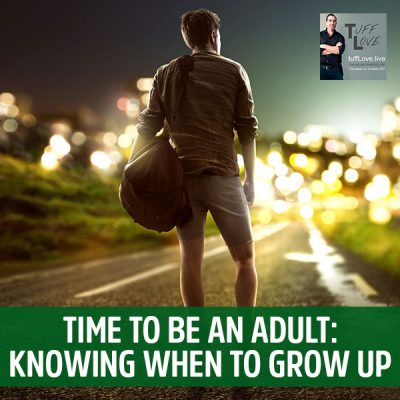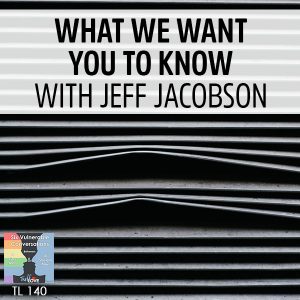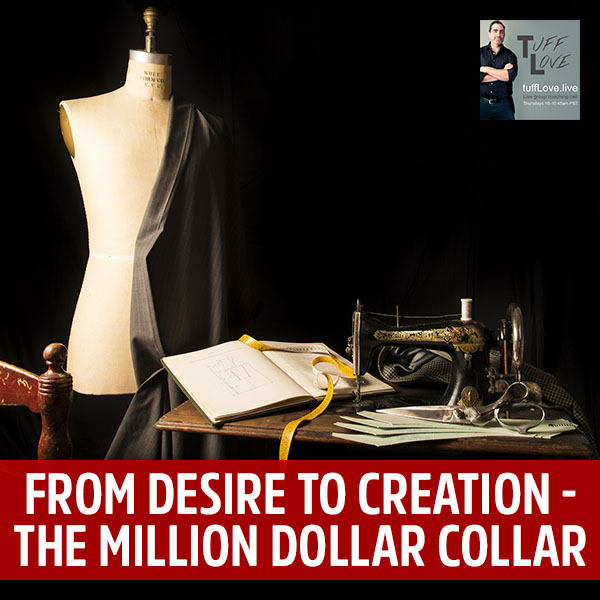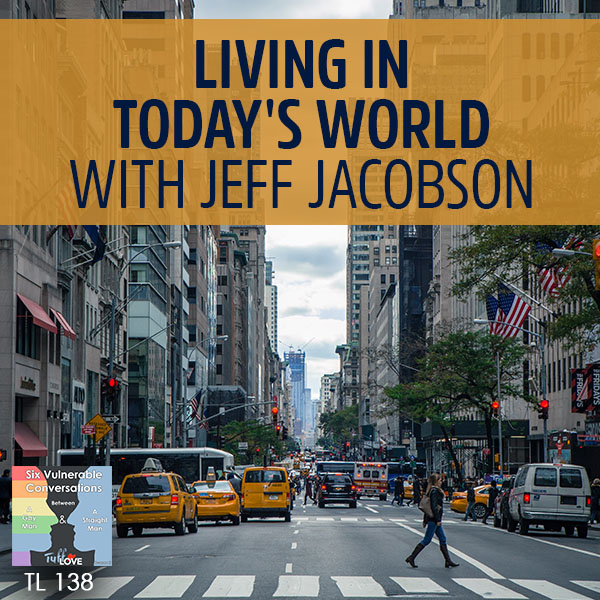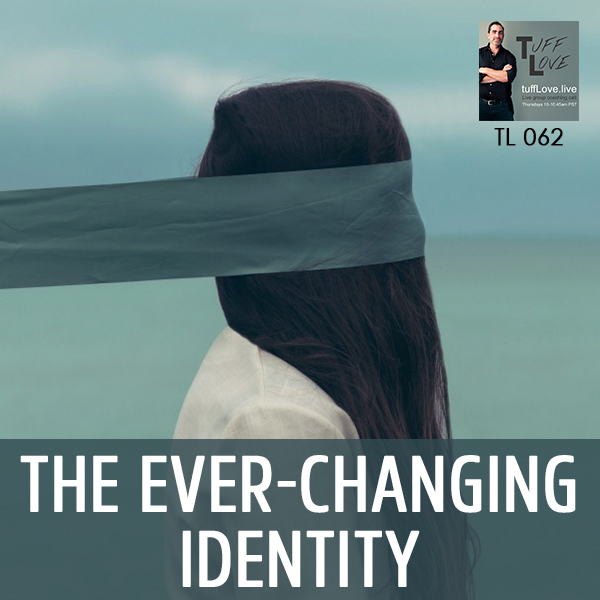
062: The Ever-Changing Identity
Mar 7, 2017
Who are we? What is our identity? Everything is constantly changing and nothing lasts forever. It’s important to look into identity because who we think we are and who we choose to be matters in living life the way we want to live it. An in-depth experience of looking and exploring our own identity starts with defining what identity is. One definition of identity is a relationship that a thing bears only to itself. It’s how we look at ourself. That’s unique and something that’s very specific only to ourselves. Identity is constantly changing. So what do we do? How do we handle the constant change? How do we live inside of us? We contain all these different parts of ourselves that make us up. We should enjoy the amazing experience of discovering who we are.
—
I’m proud to present the new episode of Tuff Love on the concept of identity. I recently had an experience of exploring my identity in a safe, expansive place. From that, I find out there’s a lot more inside of me that I’m willing to look at every single day. In this experience, I’ve learned that identity is constantly changing. I’m constantly changing. In that, all the things I hold is solid that are not changing really do change your biology, your memories, your viewpoints, your agreements, your desires and who you are in this world. This episode goes into some really basic concepts of your identity and how it makes you choose to be and live your life the way you want to live it. We then bring Elvis and Joe back on the show from Ireland to talk about concept of their identity and who they are and who they morphed and changed in these last few years of their life, and who they want to become.
062: The Ever-Changing Identity
It’s just been a very interesting time in my life as this show continues to ebb and flow. The first thing is that I’m feeling this really interesting piece around identity recently. It’s showing up in a lot of different ways. I’d first like to give credit where credit’s due in terms of the idea for the show. I recently went to do a journey and my teacher talked about identity. I wanted to give credit that she was the one who really inspired a lot of this show and a lot of the viewpoints and a lot of the concepts. Because I had such an in-depth experience of looking and exploring my own identity, that it affected all these other aspects of myself. If you go to the Facebook page, there are three clips by this thing called PBS Digital Studios called Crash Philosophy. There are three elements around identity that this show is really based on. They’re these cute little nine-minute-clips and there’s animation and the guy is very hyper like me. Really a lot of the information comes from there. Let’s give credit where credit’s due. A lot of this is from that. During my journey, I had a very deep experience of speaking out loud my identity because I talked a lot about my relationship with my dad and as my dad’s health continues to morph and change how I relate to that. I’m really finding that I’ve been looking at the disconnection I felt with my dad. Now that I’m in a world where his health is shifting, I have to really look at it because nothing lasts forever. That’s the main piece of this show is that we think our identity, we think who we are and what makes us up really matters. In the end, it just comes down to everything is changing constantly. In relationship to my own dad, my dad’s health has been one of those static things in my entire life and now that’s shifting. I find myself in relation to that shifting and changing alongside of it. Just a fascinating piece of identity how it’s coming up. Before I go into a lot of some details that I’ve garnished and learned, I want to talk about my own personal relationship to this concept of identity. The thing about identity that’s really interesting to me is it really does keep evolving. These videos talked about who you are today is very different from who you are as a kid. You think about yourself as a kid growing up, when you came, when you were born or your first five years or seven years or ten years. Who I am, who I perceive myself now is very different from that young man groping in Long Island in a very different world. Then there’s a question of, “How did I move from this shy, overweight nerdy kid to the man I am today? How did I move from that to a public speaker? How did I move to that from someone who ran an organization based on sexuality? How did I move from that kid that couldn’t talk to women that feel really totally comfortable talking to women? What was the modification from point A to point B? How did I change my life and how did I change my identity so deeply that I feel comfortable in all these different places I felt terrified when I was young?” That’s because our identity keeps shifting. Also in terms of my relationship, “How did I go from someone who never thought I would be deep in relationship with one person to someone who’s totally in love with that person?” That’s not a very old viewpoint. I walked into my relationship now in hindsight just not believing in the power of mostly monogamous really deep intimate relationship, and now there’s nothing else I could see doing. I couldn’t imagine living in a world without this deep vibe, this deep love and identity from a solo ronin wandering the world and traveling the world looking for adventure, to a man who lives in the valley, in the suburbs with two kids and two dogs and absolutely loving it. To go from the hot swinging venous lifestyle to someone who really lives a much quieter, simpler, going to bed between 9:00 and 10:00 every night kind of day, and just really loving it. I think that’s the big piece.

Identity: One definition of identity is a relationship that a thing bears only to itself, how we look at ourselves.
Let’s talk a little bit about the concept. The piece about some of the definitions of identity, and again on the Facebook page, there are all these great videos that you can watch and gets some really fun details about this. I highly recommend that. If you can’t find it, you can always email me at Help@KandellConsulting.comand I’m glad to point out the videos for you. The first thing is the definition. One definition of identity is a relationship that a thing bears only to itself, how we look at ourselves. It’s identity. That’s unique. It’s something that’s very specific only to ourselves. I was thinking about it in modern age, one thing joked is the only thing that really is constant in a human being is our name. My name is Robert Barry Kandell. That was the name I was born with. That’s the name that’s been constant. I can tell you throughout my life I’ve used many other names. I’ve been a Rob, Robbie. I used the nickname RB for my first two initials for quite a long time. When I was in high school, I was called Kid by my high school friends, so I went to college I introduced myself as Kid Kandell. All through my undergraduate that’s what people knew me as, as Kid. Then when I finished undergraduate school, I went to my Master’s in Philadelphia and I just dropped the Kid and I went back to Robert. When I would introduce myself, “My name is Robert Kandell.” I went from Robbie to Rob to RB to a Kid to a Robert. Now people say, “Which do you prefer Rob or Robert?” I’m like, “It’s all cool. I’m cool either way.” The point is that even our names will change. You can legally change your name. You can actually legally change this one thing that we think is really stoned in our identity. The second thing is a Social Security number. For us in the States, you’re born and you receive a Social Security number. That’s your unique identity. I’ve learned that they actually recycle Social Security numbers. My Social Security number isn’t unique to me. It actually can be recycled probably 50 or 100 years after I die. That number can be used again by someone else. It’s not unique to myself. I thought, “What really makes us unique?” That is our cell phone number. This is something that’s relatively new in modern age. I got my cell phone number in 1998. I remember this distinctly, we had one phone number for me and my wife at the time, Carol, in 1997. Then we both wanted phones, so we got a deal. I got my phone number in 1998.Here it is twenty years later, my life’s been totally Etch A Sketch. I’ve lived in different countries. I’ve lived in different cities. I’ve changed my height, my weight, my facial hair, but my fucking phone number has been the one constant thing in my life for all these years. No address has caught up with me but my phone number stayed with me. Even when we know that, we change phone numbers, other people get your phone numbers. Even that is not specific to you. There’s nothing that’s really detailed towards you. Back to these videos, I want to bring up some really great points to give us some things to chew on around identity. One of the things that they talked about, there are two types of properties that you can assign to something to make up your identity. There’s the essential properties, core items that make it up as your identity is essential. Then there are accidental properties, things that you can re-removed. Something that was really interesting is a dog without a tail is still a dog. A tree without its leaves is still a tree. What happens when you go from tree to notebook? All the steps that exist between the two, when is it still a tree? When does it turn into something else? You have the tree, you cut down the tree is, is it still a tree? You cut the tree into little pieces. Is it still a tree? You turn it into a pulp? Is it still a tree? Then you turn that pulp into notebooks. At what point does a tree stopped being the tree? That was the point. What part of your life do you actually morph from point A to point B? There are also some theories that have come up throughout the years. Something called The Body Theory. The Body Theory says that we’re in the same body and that’s the thing that makes up our identity. That’s the thing that keeps us whole. As you might know, your body is constantly changing. The body I had when I was twelve is very different from the one I have now. My biology changes. My skin is constantly shedding and changing. Even my blood cells, even my skeleton is constantly changing. The body is not the same. Then there’s a thing called The Memory Theory. When the thing that makes us up is a connection, the collaboration, all the memories we have, that’s what makes up our identity. We have a memory of who we are from point A to point B. Then there are thoughts against this in terms of you don’t remember when you were born. You don’t remember who you were your first couple of years. Does that mean that it wasn’t part of you? Also memories shift and fade and morph and alter. We all know that memory is highly suggestive as well. It’s how we view something that happened to us. Even a week ago is probably very different from someone else observing it or even our own viewpoints. Our memory shifts and changes. What happens if you have dementia or Alzheimer’s? What happens when you lose your memory? Does that mean you lose your sense of self? At what point you can’t use memory as a way to define yourself. What do we do? How do we handle the constant change? How do we live inside of us? David Hume, a philosopher, said, “Identity is actually millions of impressions folding into the impression that we are the same, that we are not changing.” It’s how we trick our mind into believing that our identity is constant.” Even that is subjective. Even that is constantly morphing based on our own thoughts. What women said, “We contain multitudes.” I really like that because we are very different in all different parts of ourselves and who we are. Who we are with one person, the identity we know. When I’m with Morgan, I’m very different than I’m with my buddies when I’m having coffee in Venice. Who I am with the kids is extremely different than who I am with my parents. Rightfully so, I contain multitudes. I contain all these different parts of myself that make myself up. It’s been this amazing experience of discovering who I am. Identity is actually millions of impressions folding into the impression that we are the same, that we are not changing. Click To Tweet What does this mean in the grand scheme of things? What does this mean and how can we actually relate this to our life? I think we’re really victimized by our identity. We’re victimized by who we think we are in and more over who we think we should be. My first 28 years, my identity was really based on what I perceived as the expectations of my parents. I live my life in a very strict accord to the book, to the path that they laid out to myself. I was very stuck and identified with being a good son, a good citizen. I was stuck in that identity. I’d never even thought that it would be possible that I would change. I thought I was just going to go along this path. That’s the greatest crime that I believed in myself, that I didn’t even think that it was possible. That this life given to me was the life I was going to choose, very straight-laced, very vanilla, very straight forward. It just took one huge influence in my life. My wife at the time to say, you don’t have to live this life that was laid out for you. You have an option to actually change. In this really important experience of when I went to Burning Man in 1998, I saw that there was different identities, different parts of myself inside. I was shocked to see who that person was and what that person wanted. Burning Man led to sexuality and sexuality led to courses and courses led to the Landmark Forum and Landmark Forum led to deep investigation and starting OneTaste. All these things happen because I actually thought that it was possible. There are times now when I’m driving home to the valley and I’m in my nice car heading towards my nice house for my nice world that I’m in. There are thoughts of just Etch A Sketching everything. What if I just turn the car around? I’m not in jail for anything. I have no agreements that says I must go home to this life, this identity I created. There are times I’m thinking I could just move to somewhere else and be someone else. I know everyone, including Morgan, probably has these thoughts. We have these thoughts of just putting a bomb in our life and totally Etch A Sketching it. Luckily these thoughts last about 45 seconds to a minute. Then I feel into the absolute joy of my life. I feel into the depth of how much I love the experience I’ve created. I’m like, “I never want to change that piece. I love this piece about myself.” There are parts of myself that has to always take that into effect. We have to look at the lessons and the messages that are coming. Morgan said to me she wants to leave Los Angeles at some point. For me, I was like, “I couldn’t even imagine leaving Los Angeles when I first said that.” She’s like, “I think I want to move to Costa Rica.” I’m just like, “I couldn’t even imagine living in Costa Rica.” Then I went to Costa Rica and I felt it. I was like, “I actually could do this. I think this is a cool idea.” The ability to see that your identity is not stagnant, your identity is not 100%, you are not your identity, gives me and gives you the opportunity to expand and explore different parts of yourself that want to be felt. I’m not saying blow up your life unless you really want to, but I am saying allow those parts of your life into it to educate you and to inform you of what you want. I really like being in JourneySpace. What happens in JourneySpace is that different parts of my mind and possibility come in. There’s not the block. The greatest crime we have is we block parts of our thoughts and our identity from not letting us inform us. We keep that hell down and we keep that unclear. We don’t want to see it. Why don’t we want to see it? Are we embarrassed about it? Are we afraid? Are we worried what will happen if we actually let those parts out? What parts of you are you truly afraid of? My sexual being was so repressed for a long time and then it came out, and then it came out big and now here it is twenty years after opening it up and I actually have a really solid sense of who I am and enjoying these parts of myself. It’s the crime when we don’t let it out at all. One last piece that I want to bring up is that this concept of totally changing. We’re in total flux. Your biology is in total flux. Your mind’s in total flux. Your memory is in total flux. In these videos that I was talking about, it’s the concept of, we make the agreement on Monday that my boss is going to give me a raise, but by Friday what if the boss and me are totally two different people? In that five-day span, we’ve totally shifted a lot of our thoughts and a lot of our biology. Does the boss still have to give us the raise? Do we have the expectation of that raise? Do we have the expectation of even being paid? The question is that we are built upon our expectations in our agreements. Our agreements are a huge part of our identity. I’ve made many agreements with Morgan, all them very pleasurable for me. The main agreement is I’m going to be fully who I am and honest and bring it to the relationship. I hope in the space for her as well. Even though we’re constantly changing, we still have inside of us the parts of ourselves that are important to keep constant; constant to be a constant source of support for Morgan and the kids, to be there for my mom, to be there for my dad, to be available to my friends, to be a place to show up on the show every Thursday. Even most Thursdays when I don’t want to do it, I still show up because part of my identity is a man who keeps his agreements.

Identity: Honor those parts of you that want to come out. Honor those parts of you that want to be seen and heard.
The most important thing is those agreements do have the ability to change. If you feel imprisoned by your agreements then what you can do is negotiate them, talk about them and find the different parts of you that want to arise. Look at yourself, look at your identity and look where you want to expand and grow and honor those parts of you that want to come out. Honor those parts of you that want to be seen and heard because you never know the next phase of your life. You’re not victimized by your life unless you allow yourself to be victimized. Take the steps to know who you are, where you want to go, and be that person and change your identity and live your life the way you want to live it. That is today’s rant. Thank you so much.
Live Coaching
Elvis, thanks for volunteering to be on the show. Hi, Rob. How are you? How can we make this most valuable for you? I was just thinking about what you were saying. I wrote a testimonial earlier on for you and at the end, I needed to put on it something about myself, something who I was, my title or where I lived or something like that. As I was writing it down, it was making me laugh because it was like where do you stop? I put on what I do for a job. It seemed like it was only a tiny little bit of me that was put down. It made me interested in that thing of identity. I asked you to write your name, your position, your title, and that’s because other people who are seeing the testimonials on my website, like seeing that so they have a baseline way of connecting to you. Our identity is our social grease, our social connection so we know who you’re dealing with. If you wrote, “Elvis, Serial Killer, Surfboard Instructor,” then I would react differently than you if you just wrote, “Surfboard Instructor.” If you were a serial killer, I don’t know if I’d want to be in the same room with you. That’s who we are. We look at our identity and we make our choices based on these silly words that come across. I still love you if you were a serial killer. I like saying what other people talk about themselves, even just on Facebook where it has somebody’s name and underneath it might have something that they do, somewhere where they live or something strange that they want to attach themselves. I like it too. What did you write on your testimonial? Work-based stuff, that I teach people to surf and I make surfboards. I put on it body worker because unexpectedly I’ve started working with people doing body awareness stuff. That’s come out of the blue and grown really quickly but so did the other stuff, just exactly the same. Then I’ve put as well that I was a father and a husband and a lover. Let’s pick those apart. What part of you is the surfboard instructor? Why do you claim that as part of your identity? That’s my bread and butter. It’s through that job that we basically pay for the shopping each week and that we pay the rent and sustain ourselves financially. That’s a big part of it. It’s like farming almost, it’s really seasonal. It happens in the summer in a massive chunk, all in one go. Then throughout the rest of the year, it’s just little bits and bobs. Let’s say it’s three months of the year that you are an actual surfboard instructor. That’s your top list. That’s your top piece of the puzzle. 75% percent of your life you’re not being a surfboard instructor, but you still put that as your profession. Is that someone you identify with? Is that the cool part of you? Why do you advertise that as your top, even though it’s only 25% of your life? It’s probably because if somebody asked me what my job was, then I’d say that’s my job because officially getting paid and all that sort of stuff, that’s my job even though mostly it’s taken up doing other things that are way more interesting. What part of your identity wants to come out? It changes every day and I’m really aware and I’ve seen stuff coming up. It’s like the wheels are turning faster over the last couple of years, it’s really speeding up. It’s gone into much more of a place of allowing anything to come up and to really look at what it isn’t and go with it. For instance, this thing of working with people, doing body work with them, that just came because I needed to keep myself in better shape because of the instruction job that I do is really physically intense. I needed to keep myself in better shape. I dive into that a little bit more. What came out of it was a really strong practice for me. It’s really easy to share that practice with other people because I’m really a passionate. I’m really good at sticking to doing what it is I’m going to do. I’m dedicated to the practice. It’s that easy for me to do it. It’s easy for me to help people out that are less dedicated. I really noticed that’s a really big part of my identity that has been there all through my life but it’s shown up in different ways. There are things that change your life so much that they can’t help but have a knock-on effect in your identity. Click To Tweet Part of your identity then is helping those and helping yourself by helping them, to be available to connect to people? Yeah. A big thing for me then has just been coming into contact with those people that really expand those ideas and those horizons and those boundaries. A year and a half ago when I started watching Tuff Love, it’s such a big change and unloads of other things at the same time. Those things, they change your life so much that they can’t help but have a knock-on effect in your identity. From being this slightly closed off shut down normal guy, all of a sudden somebody that can look people in the eye and ask them real questions and listen to them and talk to them and connect to them on a completely different level. I’m really glad to hear that because the world definitely needs more people paying attention to other people. We are living in the world of isolation. Your ability to give that attention is really a powerful tool. That’s had a knock-on effect through everything, through work, through all of my life. Do you want anything else we could talk about today around identity? No, I just feel like I’m waffling. How about you, Joe? I love seeing your pictures of your rocking days. That’s a funny thing because that used to be a real strong identity, Joe Doran of the Telescopes. I moved to Ireland and I just assumed that nobody knows who I am. I go out dancing in Dublin and it’s just that nobody knows me from those days. Then every now and again people will mention it and it’s like, “Yeah. I used to do it.” They are not surprised. They know you’re in a band but you’re not the only person in the band. Are you proud of that part of your identity, your history? I am, yeah. It was done under difficult circumstances. I think if I was to do it now, I’d enjoy it more. It was definitely a great experience. It’s a brilliant thing to do when you’re in your late teens or early twenties to be in a band. Every once in a while someone will recognize me for what I do or what I did with OneTaste. There’s always this ego boost. There’s always this feeling of, “They do recognize me from something they saw or something along the way.” There always this feeling of pride and there’s also some shame around when I used to do it. There’s some shame around how I handled things. It’s a really strange combination between the two of who I was and how I acted and now who I am today. It’s just this conflicting feeling I feel between the two. I also feel I don’t reveal everything about myself. There are parts of my identity that I don’t reveal to everybody or there are things that Elvis knows about me that nobody else knows. Like what? I don’t want to announce it to the world. You don’t have to. In sexuality terms that people would assume certain things about me maybe based on perhaps my upbringing or whatever. The fact that I’m married to a man, they would assume certain things. There are certain things that have come to realize my steam juice myself in the last say a year, maybe two years. It’s just a gradual realization that those thoughts I had years ago with that and I assumed there was something else. Now I’m speaking in code.

Identity: A huge part of our identity is the need to be accepted. If we’re not accepted, we hide that part.
I get it. It’s hard to bring those parts of ourselves out because of who we’re accepted. A huge part of our identity is the need to be accepted. If we’re not accepted, we hide that part. The greatest thing your partner can do is allow all parts of your identity out, respected and desired. I think that you have that with Elvis. I feel that with Elvis and I feel that with Morgan. The greatest thing I try to teach couples is those parts of yourself that you don’t encourage will go into fetish and go into hiding and you’re not even relating to that person anymore. Allow the different parts of your partner’s identity that come out and be real. I’m able to reveal myself fully to Elvis. Sometimes I wonder is there any benefit in revealing yourself fully to everybody? To me, if I was to reveal certain things to my parents about myself, I don’t see the benefit that it would bring about. It would probably bring about more problems, more confusion. Do they need to know certain things that don’t really affect them directly? To me, it’s just how much of your identity do you want to reveal, who you want to be. It’s always a judgment call. Especially because it still feels fairly new to me. I know that it would be a shock, do I reveal that part of myself or do I keep it as mine? It’s completely accepted between me and Elvis. Who else needs to know? Thank you so much for being on the show today and jumping in. Thanks, Rob. Thank you so much for Elvis and Joe for being on the show. We’ll be back with a show on a different topic. Thanks so much for coming. If you’d like to make a donation to the show, visit to Patreon.com/TuffLove. As always, if you’d like to go to iTunes, leave me a review. I would be very grateful. You can search me on iTunes under Tuff Love with Rob Kandell. Thanks so much for being on the show. Go forth, find yourself, be real. Be true to yourself, enjoy. Look at your identity and find that part of your identity that wants to come out. Then decide if you want to tell the parents or not. Sometimes it’s smart to keep your mouth shut, other times it’s smart just to let it out and let the chips fall where they may. Thanks so much for being on the show. I’ll see you next week. Take care.
Resources mentioned:
Podcast: Play in new window | Download




